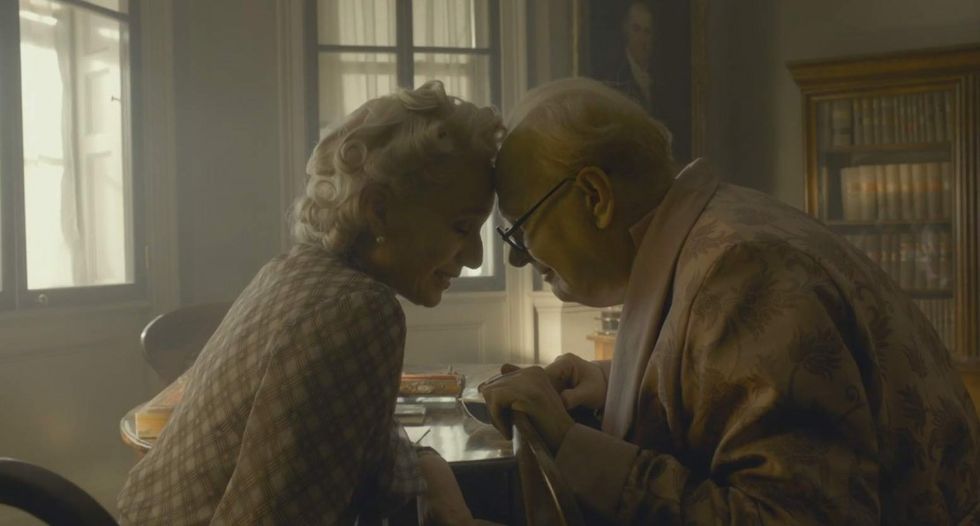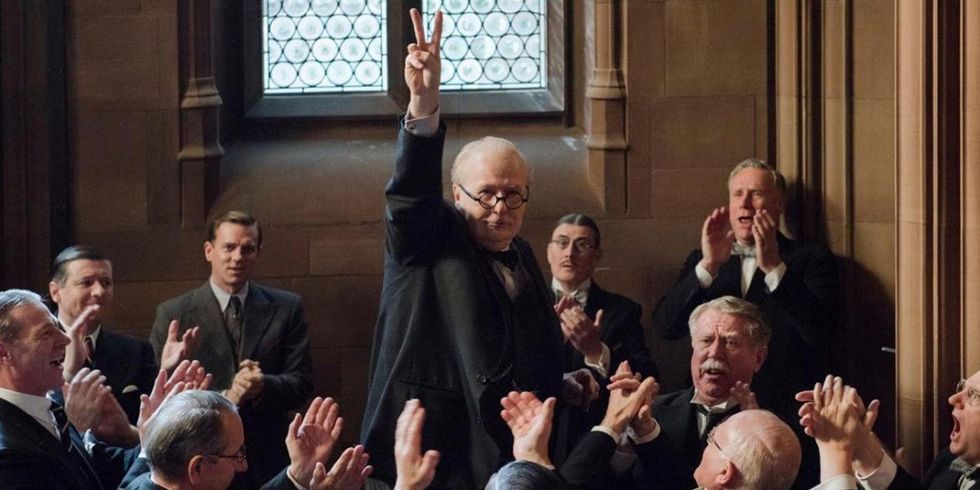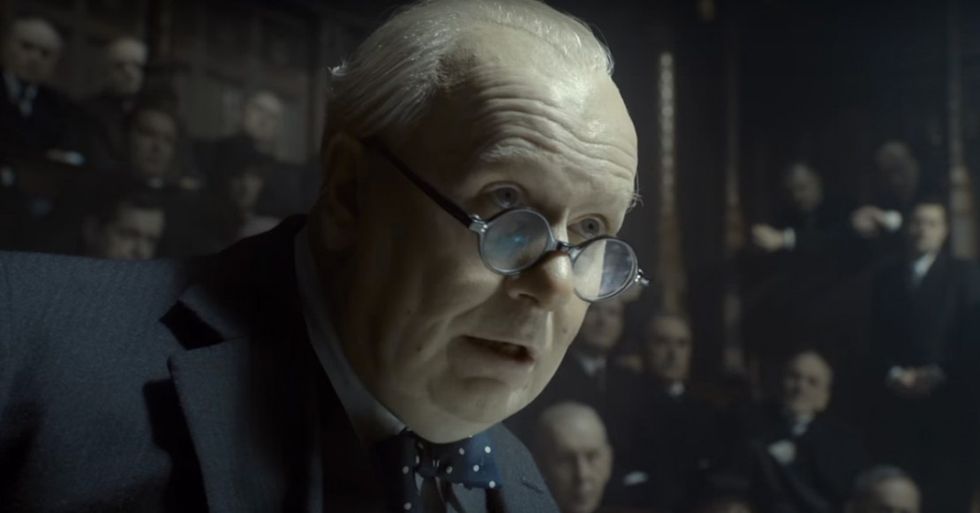Why Joe Wright's 'Darkest Hour' Might Be Gary Oldman's Brightest Moment
Could 2018 finally be the year for Oldman's Oscar win?

The Toronto Film Festival continued this week with the North American premiere of Joe Wright's Darkest Hour; a drama about the earliest days of Winston Churchill's prime ministry, when the freshly anointed politician was forced to navigate the waters of a peace treaty with Hitler. The Oscar buzz is out and it looks like this could be the role that finally strips Gary Oldman of the title, "Best Actor To Have Never Won An Oscar." If Leo can do it, why not Gary?
The panel was moderated by Eric Cohanic and featured director Joe Wright, Gary Oldman, Kristin Scott Thomas (for her role as Clementine Churchill), Ben Mendelsohn (who played King George VI), and the film's screenwriter Anthony McCartan.
They discussed why no one wanted to make this movie, the hours of prosthetics it took to pull it off, and the vape-sesh that made it all possible. Check out the best moments below.
From Sid Vicious to Winston Churchill, plus vaping
"I laughed a lot," said Wright about his initial reaction to the project. "The script, surprisingly given its title Darkest Hour, is actually very, very funny. So, I laughed, and then I cried." He was surprised by the freshness of the text, considering the well covered territory of its topic. Still, Wright was hesitant, thinking no one would want to see another film about Churchill.
It didn't take long for him to change his mind. "As soon as Gary [Oldman]'s name came up, I knew that I'd go and see that movie." Wright went on to explain, "Gary's been a hero of mine since I was about fifteen, since he played Sid Vicious in Sid and Nancy. And the idea of a career that goes from Sid Vicious to Winston Churchill seemed too tantalizing, really."
"The idea of a career that goes from Sid Vicious to Winston Churchill seemed too tantalizing, really."
"So, I went and met Gary." The two were both nervous to meet the other but soon became fast friends. "We went outside and vaped together. And by the end of that vape, we were like brothers really, brothers. That was it."
"True story," Oldman interjected.
"That happened," laughed Wright. "Honesty is the best policy in these situations."
Kristin Scott Thomas's Clementine is a classic "woman behind the man"
Thomas wasn't too familiar with Clementine Churchill prior to reading the script. "I grew up with images of Winston Churchill and this rather strange looking woman who was his wife."
Otherwise, Thomas had no idea how influential "Clemmie" was. "I discovered that she was an absolute fighter and defended many, many different causes, and was incredibly engaged during the war. She was an immense support to this man who was riddled with insecurities."

Ultimately, Thomas found her role was a beautiful way to reveal Churchill's more human side. "What I think is so fascinating about this film," Thomas explained, "is that you have this man who was able to articulate all these incredible feelings of pride in his country, to engage people and unite them, but the man himself, the man who was creating all of these amazing speeches was actually just a human being like any other. What was attractive to me in playing this part was the fact that I could actually help reveal the very human side to him. The man rather than the hero."
But she still wasn't convinced, at first
"When I first sent the script to Kristin she said 'no,'" said Wright. "And I said OK, can I come and see you in Paris, and just have a cup of tea with you?" Thomas joked, "No vaping. Choose your weapon." So, Wright flew to Paris and went to work on convincing his leading lady. "There was a moment where [Kristin] looked kind of dreamily off and said, 'you know, Clemmie had very good ankles.' And I knew that I had her."
"Funnily enough," he added, "the ankles were a recurring theme throughout the process of the movie. Gary was all about the prosthetics, Kristin was all about the ankles." Thomas concurred, "Yeah that's the sort of actress I am."
Oldman's version of Churchill is cheeky and covered in manure
An audience member asked about Oldman's fresh take on the role. How did he find a new way into such a well-explored character? How did he take someone so historically boorish and make him empathetic?
Right off the bat, Oldman submitted a correction to the global consciousness. "Well, I think in part, there's a lot of quite radical revisionism that goes on with Churchill," he said. "To begin with, I don't know if he was such a cruel man as he sometimes portrayed by detractors and critics of him."

As for the fresh take, he didn't watch any fictional portrayals of the famous figure. Instead, he watched the less-seen newsreels. "There's one particular piece of him in Africa where he's in a tent with some soldiers and he's uncharacteristically drinking beer." Oldman painted a picture far from the prime minister we all know. "It's hot and it's swarming with flies, and he's like a pig in manure... He's alive. He's alert. He's skipping around. He's sixty-five, yet he's moving, jumping around like a thirty-year-old."
In viewing footage like this, Oldman began to build a more rounded concept of Churchill, one that was not only serious and strong, but also full of life. He and Wright discussed in rehearsal. "[Wright] would say, 'He's really naughty isn't he? He's quite sort of cheeky.'"
Humor is the key to humanity in writing
Wright and McCarten also found humor to be the key to understanding Churchill's mind. "I've always felt that not enough justice has been done to his sense of humor," McCarten stated. "He believed it was an essential element of seriousness—that you couldn't actually claim to be a very serious person unless you understood comedy and humor."
"[Churchill] believed in the very core of his very poetic soul that words could be enlisted to change the world."
McCarten recognized Churchill's dedication to the English language and tried to write him from that same belief. "He really used humor as an agent for change, as if a difficult message coated in honey would be swallowed." McCarten continued, "He was primarily a writer, and at the end of his life he had written more than Shakespeare and Dickens combined, so he believed in the very core of his very poetic soul that words could be enlisted to change the world. That was certainly my entry point into him."
Mostly prosthetics, but a little Gary too
Just because Oldman didn't pull off a Christian Bale-like weight transformation doesn't mean his performance suffered. In fact, he told TIFF Red Carpet Live that he might've gained the weight if he were a little younger. That didn't stop them from promoting the much-discussed rumor of Oldman's likely Oscar nomination. So how did the Darkest Hour team pull off an Oscar-worthy performance with their lead buried in rubber? It turns out the key is prosthetics master, Kazuhiro Tsuji.
"The most important thing was to make sure that we didn't end up with something that looked very much like Winston, but was impossible to act through."
"Gary knew of a prosthetics guy, Kazuhiro Tsuji, who lives in a warehouse in downtown Los Angeles and makes these incredible sculptures," said Wright. Together, Oldman and Wright managed to lure Tsuji out of retirement for this special project.
"Very quickly it became apparent that he was going to be able to transform Gary as was required." But the rest was a game of trial and error. "The most important thing was to make sure that we didn't end up with something that looked very much like Winston, but was impossible to act through. So, it was about finding the right balance between Gary and Winston."

Fortunately, Oldman's talent with character was able to complete the distance to a full transformation. "Somehow," Wright continued, "there are certain actors who are like magicians, they're shapeshifters. And by a sheer triumph of the imagination, they are able to transform themselves and make you believe that they are that character. And that's an incredibly powerful imagination, slightly weird, and a form of kind of a dark art possibly. But they're able to do it they're able to make you see things that aren't really there, and Gary is one such wizard."
In response to the idea that sitting for hours of prosthetics every day might be a burden, Oldman answered, "As I said earlier, here's a man (Churchill) who's sixty-five years old and he takes on Adolf Hitler, so for me to sit there in three hours of makeup is... you know, it could be a lot worse, couldn't it?
Modern audiences are in want of a leader
We may be in a time, similar to that of Churchill's, where the everyday person is looking for a leader. Oldman suggested that it might be for this reason that audiences seem to be connecting to Churchill's history now.
"Maybe we're seeing that pattern again, maybe we have been in between and something is coming. Maybe that's the zeitgeist."
Oldman explained how Churchill was a visionary for his time, and how just after WWI in a time of peace, Churchill was worried. "He was looking at past patterns, and he was always someone saying, 'Look to history, always look to history and it will guide you.' He saw a pattern happening and believed that we were in a sense in the eye of the hurricane."
"He actually stood up in parliament and said 'Hitler's killing the Jews and you know what? He's going to come and kill you.' No one believed him. We had good relations with Germany, we didn't want to offend them." Oldman continued, "Maybe we're seeing that pattern again, maybe we have been in between and something is coming. Maybe that's the zeitgeist."
You can watch the full press conference here.
See all of our coverage of TIFF 2017.
Source: TIFF 2017











